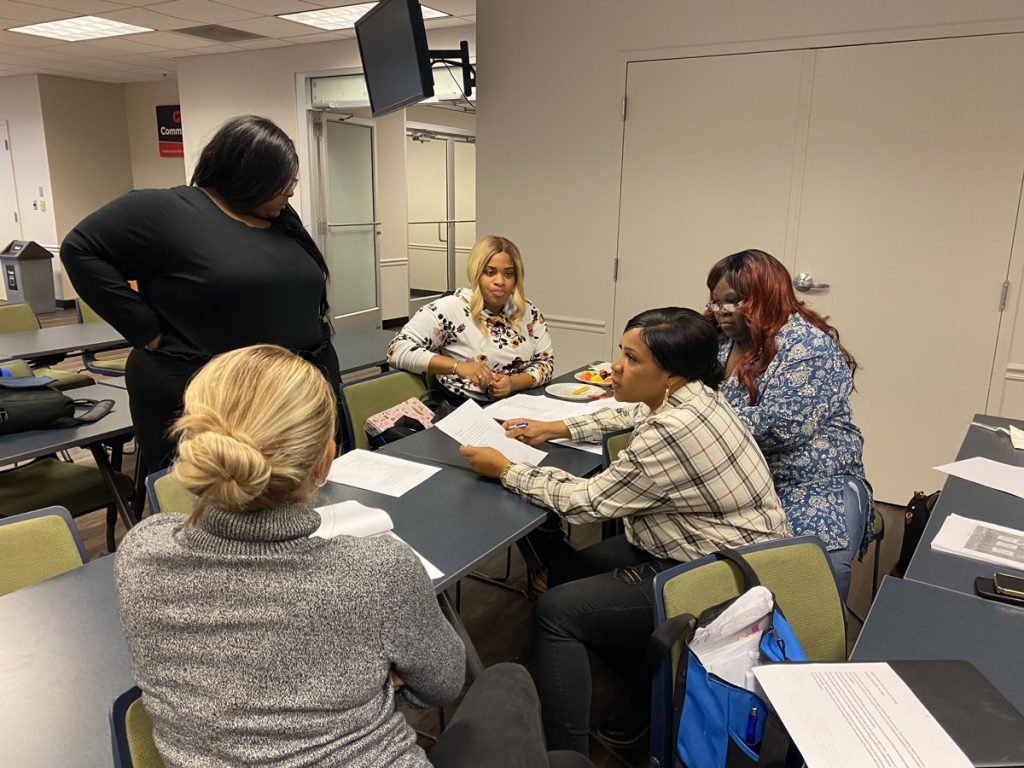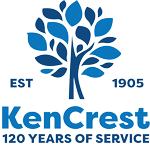
A few people learning about the Happy Healthy Life Program. // Photo courtesy of Angela Marshall
KenCrest’s Director of Supported Independent Living introduces the Happy Healthy Life program to those she supports.
By Sydney Kerelo
In the United States, one in four adults—61 million—has a disability. Of that population, many adults with disabilities report experiencing frequent mental distress almost five times more often as those without a disability, according to the Centers for Disease Control and Prevention.
“Individuals with intellectual and developmental disability (IDD) are at high risk of co-occurring mental health conditions, including major depressive disorder, bipolar disorder, anxiety disorders, psychotic illness, impulse control disorders, and others,” writes the National Library of Medicine. “Most mental health professionals receive little training about the needs of this population, and system structures typically bifurcate care, when, in reality, conditions can be complex and overlapping.”
KenCrest’s Director of Supported Independent Living, Angela Marshall, regularly witnesses people with disabilities in her program undergoing mental health diagnoses like anxiety and depression. Five years ago, while working as KenCrest’s Director of the Personal Support Network (PSN), she had several individuals she served―go through the Happy Healthy Life program at Indian Creek Foundation, and everyone loved it. Little did she know, KenCrest’s President and CEO, Marian Baldini, already purchased the curriculum from JEVS. So, she thought, we should do this at KenCrest?
For many years, Marshall would hear from her staff, ‘Well, they’re in supported living, so they should be able to handle their own mental health.’ When in reality, that’s not always true.

Marshall knew that the program was missing pieces to it. She understood that if someone struggles with anxiety or depression, or if they struggle with loneliness or their self-esteem, it all plays into their decision-making. So, she designed an internal program that will give the people she supports the proper tools to learn how to cope and advocate for themselves.
The Happy Healthy Life is a benefit of Supported Independent Living, and offers people with disabilities ten different modules:
- How to lead a happy, healthy life.
- Understand what a mental diagnosis is.
- Manage symptoms of that diagnosis.
- Build relationships.
- Use medication properly.
- Manage drugs and alcohol effectively.
- Ways to reduce relapse.
- Cope with stress.
- Cope with other symptoms.
- How to speak up for oneself.
“When I was looking into my strategic plan for the year, I was looking back on the people who were denied, and many of them had a severe mental health diagnosis that we could not address,” says Marshall. “And for the couple of people that we had in the program with severe mental health diagnoses, we only supported them for less than a year because it was challenging. We’re always equipping the staff with new ways to help people cope, but we’re not necessarily equipping the people we support.”
In September of 2023, Marshall and her colleagues, Vince Waskiewicz—who is serving as coordinator for this new initiative—and Deidre Thomas—a program manager in Supported Independent Living who is going to school for Behavioral Health—introduced the program in September to KenCrest staff at the Giant Conference Center in Willow Grove. They wanted the Organization to understand the program’s significance and how beneficial it would be to the people being supported, staff members, and other employees.

Happy Healthy Life is based on the Illness Management and Recovery Program. It takes everyone through a three to six-month program, teaching individuals about mental illness and ways to overcome it. Each client would have a mentor, either their staff, family member, or community member, who helps them through the program. Participants will have home practice with their families and other supporters to allow them to make connections.
The program intends to help participants increase their social connection with peers, achieve tools for mental and emotional recovery, and utilize coping skills. They will improve relationships with behavioral health providers, and hopefully have a greater insight regarding mental health diagnoses, including symptom identification.
“It’s ok not to feel ok. It’s hard, uncomfortable work, but it’s necessary,” says Marshall. “The Happy Healthy Life program aligns with KenCrest’s mission to be person-centered and for everyone to achieve a meaningful life. The program allows everyone who went through it to take the reins and empower themselves for the better.”
Do you have a mental health diagnosis and a diagnosed intellectual disability and want further assistance from KenCrest? Please get in touch with Autumn Miller at Autumn.Miller@KenCrest.org for more information. If you live in Pennsylvania and are experiencing severe mental distress, please call or text 988 to connect with a 24/7 free and confidential support network.
